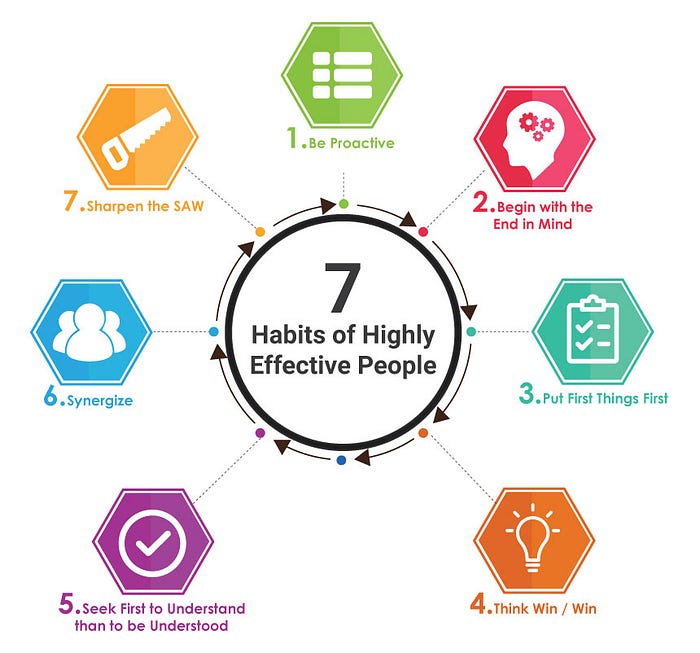Working on Successful Habits
I read 7 Habits of Highly Effective People about 5 years ago. Since then, I’ve worked on improving these habits. I thought I was overdue to share my impressions— as I continue to work on all these habits.

All these years later, I’ve deviated from the book, I’m not sure by how much. I hope to add some helpful context or perspective. I would love to hear thoughts on my adaptations and interpretations, if they helped you or didn’t.
To start, let’s define success
Covey studied 200 years of literature, he identified a change in how humans define success. Prior to the 1920's, success was based on character (integrity, courage, humility, temperance, justice, patience, simplicity, modesty). In the 1920's, success seekers shifted to surface-level personality (public image, attitudes, and behaviours).
If you want to be successful, you have to address problems at the core, at the level of your character (e.g. integrity). How we truly succeed is in long-term fulfillment by creating habits that build character, and not in finding short-term easy answers.
Be more concerned with your character than your reputation, because your character is what you really are, while your reputation is merely what others think you are.
— John Wooden
Independence — Self Mastery
1. Choose an Empowered Story (Be Proactive)
Our lives are comprised solely of the stories we tell ourselves. Nobody has a perfect memory, it wouldn’t be useful anyway (it’d be too slow). So, we are simply our remembered selves.
Odd as it may seem, I am my remembering self, and the experiencing self, who does my living, is like a stranger to me.
― Daniel Kahneman
Each of us can choose to have the story we remember be one where we have all the power (or where we are powerless). Choose to be powerful. Focus your story on what is within your control.
Success is peace of mind that is the direct result of self-satisfaction in knowing you did your best to become the best that you are capable of becoming.
— John Wooden
You either walk inside your story and own it or you stand outside your story and hustle for your worthiness.
— Brené Brown
Focus on a Growth Mindset. When you fail, look at what you could’ve done better. Failure is good. It is rich in learning and helps build your character.
If you’re not failing, you’re not pushing your limits, and if you’re not pushing your limits, you’re not maximizing your potential
— Ray Dalio
Being proactive means to take a second or a minute, think about how you want to respond then do so with intent.
2. Have Vision and Principles (Begin with the end in mind)
Although, we can find happiness every day without vision or principles, in order to be fulfilled in life we need to start with a vision.
Create an inspiring vision to pull you out of business-as-usual thinking. Your vision should be something you can imagine clearly — imagine what it will look, feel, sound, or smell like. How will your connections to the world around you change?
We also need principles to guide us towards our vision.
The most important thing is that you develop your own principles
― Ray Dalio
You may develop multiple visions of your future-self. Your visions may change over time. Similarly, you will gain new perspectives and refine your principles. This should be a continuous process of improving what you stand for and what you want to create in the world.
Both vision and principles work for in the long-term. In general, even in the short-term, always try to respond from your vision and principles rather than being reactive, think first.
3. Focus on the “Important and non-urgent” (First Things First)
There’s a lot going on in the 4 quadrants Covey uses. In my experience, this boils down to focus energy on doing the important and non-urgent. The important-urgent will take care of itself.
Wikipedia has a good summary:
- Important and urgent = Do
- Important and non-urgent = Plan
- Not important and urgent = Delegate (If you can’t delegate, revaluate your circumstance. If these are more than minimal, either your vision/principles need updating or you need to make a change).
- Not important and not urgent = Distraction
I find developing a system like Getting Things Done has helped prioritize important work. Time is constant and unchanging, don’t try to manage your time or schedule. Manage your priorities.
If you don’t pay appropriate attention to what has your attention, it will take more of your attention than it deserves.
— David Allen
Interdependence — Relationship Mastery
4. Be the whole (Think Win-Win)
It’s important to consider the perception of all people involved. Everyone involved must see this as a win for them personally. Whenever you win at someone else’s expense, it’s a short-lived victory, loss, or draw. These types of wins will only be a win in a small context and will have negative personal or physical impacts on the next project — that is, it is a zero-sum game we want to avoid.
In software development, the most important thing we do is decision making. This should not be about consensus. This is about making the best decision. One great tool to get started, from Reinventing Organizations, is the Advice Process for decision making.
Any person can make any decision after seeking advice from 1) everyone who will be meaningfully affected and 2) people with expertise in the matter.
Advice received must be taken into consideration. The point is not to create a watered-down compromise that accommodates everybody’s wishes. It is about accessing collective wisdom in pursuit of a sound decision. With all the advice and perspectives the decision maker has received, they choose what they believe to be the best course of action.
Using Advice Process or other tools, everyone cannot get everything they want and that’s not the goal. Rather, the goal is to make sure everyone gets enough. In this way, we all win.
In a broader context, the most useful technique I use is to simply identify as larger than my own physical and mental needs. Drop the false physical boundaries. Instead, I try to consider my own boundaries as including the whole of what I aim to serve. When you constitute yourself in this way, you remove any conflict created by the separate distinction. The only option is to act for the whole.
5. Create safe and listening environments (Seek first to understand, then to be understood)
Similar to my focus in habit #3 on Important Non-Urgent work, the focus for me here is on the part that is often missed — accurate sensing before delivering. In order to establish our connections and have clear, efficient, communication we have to start with building a safe and trusting environment. This often requires showing up baring your vulnerability.
The only way for the leader of a team to create a safe environment for his team members to be vulnerable is [by having them perceive the leader’s vulnerability] first.
— Patrick Lencioni
Then, we need to employ our empathy and active listening to reinforce this environment and actually get to the root of what is going on for our friends, colleagues, or customers. Stay curious and ask questions.
One of the biggest threat to this is often the “urgent” or “rush” we feel. Simply slow down to go in a better direction together. Some great tips to get started having better conversations from Celeste Headlee.
6. Maximize human potential (Synergize)
This was the habit that prompted this whole post. My current ethos or vision is that: I optimize for maximizing human potential for all those I aim to serve: for friends, for customers, and for all my teams.
All the complex problems (all problems that are interesting and worthwhile to solve) are sufficiently complex to benefit from utilizing the diversity of perspectives and skills that can be harnessed from teams of people.
The key to valuing differences is to realize that all people see the world, not as it is, but as they are.
— Steven Covey
For me this habit is simply about remembering to bring everyone together; and, then, celebrate and let loose their unique qualities.
Continuous Improvement
7. Manage and improve resources and create loops (Sharpen the saw)
Grow and replenish the four dimensions of your nature: Physical (diet/exercise), Spiritual (meditation/art), Mental (journaling/leisure), and Emotional (introspection/reflection) pools. I’ve added Intellectual (reading/writing) and Social (friends/events) as separate from Mental and Emotion; as they seem to be separate resources to me.
In terms of growth, I’ve found by breaking these down I can always find an area to try to level-up. The only way to get stuck is to stop exploring.
In terms of replenishing, I find it pretty straightforward to also evaluate my current state of each, then spend more effort there. One thing I have learned, is that physical comes first for me. When I’m struggling in the other areas, starting with physical dimension can help improve any/all of them. I’ve tried ordering them in the chart below in the order they impact on all those that are below.
I look at these in a few ways: total capacity, rate of depletion, rate of recharge, and resilience (ability to withstand major blows). I’m currently looking into how to get better at measuring each of these areas as skills and also track improvement.
For example, physical capacity might be best increased through exercise — whereas physical rate of depletion might best increased by managing food-energy levels throughout the day.

Improvements in these areas enhance our ability to act in our best nature, to show up wholeheartedly more often, and show our best character.
